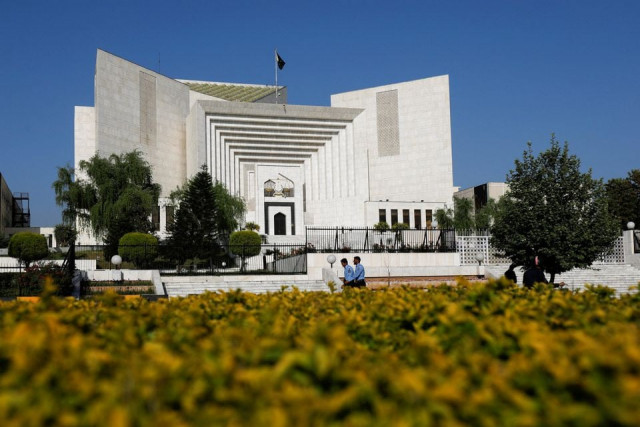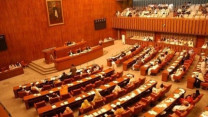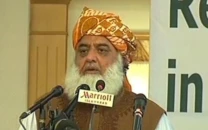SC bars public office holders from using their photographs on govt documents, projects
Apex court notes action violates Constitution, undermines Pakistan’s Islamic moorings

The Supreme Court (SC) has barred public office holders, including politicians, from affixing their photographs on public and government documents terming it a violation of their oath.
Justice Qazi Faez Isa authored a five-page judgment while questioning affixing the photograph of then Chief Minister Chaudhary Pervez Elahi on the certificates of properties situated in a Rawalpindi katchi abadi.
According to the order, affixing one’s own photograph on a public/government document projects personal interest, therefore, this is not permissible as it would violate one’s oath of office. It is also not permissible to manoeuvre or honour oneself through one’s subordinates, political associates, or in a manner that may call for reciprocal favours.
"Paid servants of the State, constitutional office holders and politicians in government must not use their positions for personal, partisan or pecuniary gain. If someone names a public/government place or property after themselves or affixes their own name or image on a public/government document, it is self-glorification, and if this is done by others, it would constitute obedience, flattery, nepotism and/or corruption," added the order.
Read: Supreme Court to start new judicial year with five vacant posts
A division bench of the apex court comprising Justice Isa and Justice Syed Mansoor Ali Shah further noted that the apparent reason to portray the image of the chief minister, who is a politician, could only be to present him to the recipients of the certificates as their benefactor and thus cultivate in them a feeling of being beholden to him.
"If the said gentleman wanted to help the homeless, nothing prevented him from distributing his own property, and, if he did so, he would be at liberty to affix his photograph on the documents of title. Self-projection on public/government records and self-aggrandisement at public expense is not permissible," noted the court order.
The court also said that Pakistan is not a kingdom, principality, or fiefdom in which the people are to be beholden to their rulers.
"We must remain constantly vigilant in maintaining the country's independence and democratic credentials. Politicians and anyone else who renders public service are best immortalised for what they did or stood for after their passing, if for no other reason than that during their lifetime, some unsavoury truth may be revealed about them, and the people may no longer want to honour them," the court order added.
Also read: ‘Strong voices’ emerge over ‘ill representation’ in SC
The judgment also said that to "name public/government properties and anything planned, developed and/or managed from public/government funds or to project oneself, as in the present case by getting one’s photograph affixed on the sanads (certificates), violates the Constitution, undermines Pakistan’s Islamic moorings, is without lawful authority, and, if one may add, is also in bad taste".
The court further directed its office to send copies of this order to the cabinet secretary, to all the chief secretaries of the provinces, and to the chief commissioner administrator of Islamabad Capital Territory (ICT) to issue requisite notifications reminding government servants that they serve the people, and not individuals in government and that they must strictly abide by paragraphs 9 to 13 of this judgement.



















COMMENTS
Comments are moderated and generally will be posted if they are on-topic and not abusive.
For more information, please see our Comments FAQ